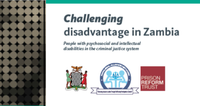Challenging disadvantage in Zambia: Groundbreaking report released
A groundbreaking report providing an in-depth understanding of the challenges faced by people with psychosocial or intellectual disabilities in Zambia's criminal justice system was published on 15 July 2015. While the research in the report presents evidence of the harrowing experiences of individuals caught up in the criminal justice system, it points to widespread and entrenched problems that will be challenging to overcome. The report, a result of a unique partnership led by the Paralegal Alliance Network and the Ministry of Home Affairs, draws on detailed research and presents a clear case for improvement and shared solutions for change.The willingness of the Ministry of Home Affairs to confront these difficulties, and to work with partners from health, justice, disability rights and wider civic society, is both welcome and symptomatic of a shared commitment to change. Based on the research findings, a number of recommendations have been made. They include:
- Collaborative working and investment in early support: change can only be achieved through a collective response across the whole system - involving health, justice, disability rights and wider civic society, and by the prioritisation of community services and social support which can help to prevent or reduce the likelihood of contact with criminal justice services.
- Tackling stigma and discrimination: Zambian ratification of the UN Convention on the Rights of Persons with Disabilities in 2010, and the Persons with Disabilities Act 2012 have set the scene for change. Strong political leadership and commitment from Government departments, allied with continuing advocacy and support from a range of civic organisations will be required to ensure these changes achieve their intended impact. Public education for all citizens is vital and could be delivered through schools, colleges, other public services and the national media.
- Addressing harsh prison conditions: this study supports the ndings of other reports concerning the harsh physical conditions experienced by people in prison and police detention, which are likely to have particularly negative impact on people with disabilities. Particular concerns raised by respondents which need to be addressed urgently include overcrowding, beatings and other forms of brutality.
- Awareness, training and guidance: stakeholders involved in this study have highlighted the need for practical and operational support, awareness training, information and workforce development for health and criminal justice personnel.

